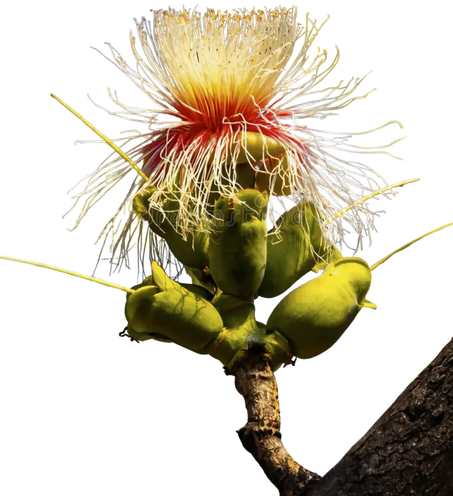Role in Nature:
The tree supports wildlife with its fruits and enriches soil fertility through decomposing leaf litter, aiding nutrient cycling and ecological balance.
Cultural Significance:
Wild Guava Tree’s leaves and flowers are often used in religious rituals and local ceremonies across South Asia.
Medical Significance:
- Bark: Known for its antiseptic properties, it is traditionally used to treat wounds and skin infections.
- Leaves: Utilized in Ayurvedic medicine to alleviate respiratory conditions like asthma and coughs.
- Extracts: Possess anti-inflammatory properties, aiding in the treatment of inflammatory conditions.
- Fruits: Medicinally beneficial for addressing digestive issues, including diarrhea and dysentery.
Did You Know?
This deciduous tree can grow up to 49 ft tall and has thick bark that makes it fire-resistant. Its leaves turn red in the cold season, and it produces yellow or white flowers that turn into large green berries.

Role in Nature:
The tree supports wildlife with its fruits and enriches soil fertility through decomposing leaf litter, aiding nutrient cycling and ecological balance.
Cultural Significance:
Cultural
Significance:
Wild Guava Tree’s leaves and flowers are often used in religious rituals and local ceremonies across South Asia.
Medical Significance:
Medical
Significance:
- Bark: Known for its antiseptic properties, it is traditionally used to treat wounds and skin infections.
- Leaves: Utilized in Ayurvedic medicine to alleviate respiratory conditions like asthma and coughs.
- Extracts: Possess anti-inflammatory properties, aiding in the treatment of inflammatory conditions.
- Fruits: Medicinally beneficial for addressing digestive issues, including diarrhea and dysentery.
Did You Know?
This deciduous tree can grow up to 49 ft tall and has thick bark that makes it fire-resistant. Its leaves turn red in the cold season, and it produces yellow or white flowers that turn into large green berries.
